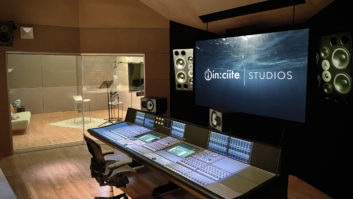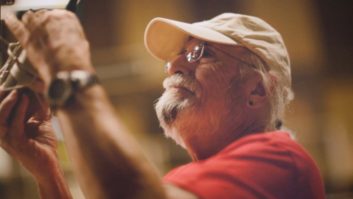Fantasy Studios in Berkeley, CA
by Christopher Walsh.

It’s always been an up-or-down business,” says Nashville, TN-based engineer Randy Poole, “and now the roller coaster dips a little lower. In August, I could have used two of me; September is completely different.”
Such is the state of commercial recording through the first nine months of 2009, though a survey of audio professionals around the country reveals a more positive outlook than in recent years. Reasons for this optimism are varied, but one explanation is a “right-sizing” of the audio recording industry. “Because of the previous shakeout that this industry has gone through,” says Jeff Greenberg of the Village, “Los Angeles is doing a good deal of business for the studios that are still here. The last 12 months have been among the best we’ve ever had. I understand it’s been a tough time, but I think everybody in L.A.–all the big places–have had a good year.”
“There has been a shakeout here,” reports Jeffrey Wood of Fantasy Studios in Berkeley, CA. “Maybe it’s gotten back to the level of how many studios a town can support, rather than there being a million studios.”
“There are studios that have gone out of business,” agrees Pat McMakin of Ocean Way Nashville, “so what I see the landscape looking like now and in the future is a very small amount of large-format commercial studios, and a huge number of what I’ve come to refer to as private studios. I think there’s a place for both.”
Indeed, audio recording continues to branch into new environments and industries, beyond the home- and private-studio phenomenon. “Audio engineers have expanded into more fields than ever before,” says Poole, “whether you’re doing music for ESPN, or gaming, live sound or some other offshoot.”
But most music-recording studios and professionals are doing more for less. “I’m pleasantly surprised at the fairly steady flow of business coming in,” says McMakin, but “budgets are indeed down. Everybody’s having to work a lot harder on a lot less money.”
“It has been busier than normal, but I’m making about the same money as the drum tech,” producer/engineer Joe Barresi wryly notes.
Studio managers, producers and engineers are adapting to the modern, lower-budget paradigm in a variety of ways. Many studios have expanded their services and reached out to non-traditional clients, while many producers and engineers have created a personal studio in order to accommodate indie budgets and take on more creatively fulfilling projects.
Wood, of Fantasy Studios, recognized the challenge facing him when took the reins of the legendary facility in 2007. “When I got asked to take over the studios, it was a large-format, multi-room facility with maintenance issues and a book that was getting less full than it had been for the previous 10 years. We approached it in a totally different way: How can we make this a creative center in the community of East Bay, and how can we do outreach and become a member of the community? We got involved in a number of aspects.
“This year, for us, was excellent,” Wood adds. “We’re booked solid through December. But we’ve had to approach it in a totally different way, and that has been a lot of work. But it’s been great in the aspect of pushing myself and the studios into a whole different area. It’s paying off.”
In addition to services such as voiceover and transfer work, and the repurposing of a smaller studio for indie bands and filmmakers, Fantasy’s rooms have hosted symposiums, video and photographic shoots, in-studio concerts, press conferences and interviews. Fantasy has also co-sponsored local music festivals, hosted charitable events and auctioned studio time for same, and comped studio time for school orchestras. “If you get involved in this kind of outreach, it does come back in the door,” says Wood. “Because we do such a wide variety and level of recording–everybody from demos to the biggest names–it helps to get the word out to all of those levels.”
“As a studio,” agrees Tom Parham, owner of Las Vegas, NV-based Hit Track, “you really have to do everything: recording, mixing and mastering, transfers, video shoots, rental, remote recording and maybe an indie record label.”
Boston-area Q Division Studios, in Somerville, MA, has operated the Q Division Records label for a decade; last year, says co-owner Jon Lupfer, the studio added a custom music service for TV and film clients. “It’s true that that is in response to a desire for other sources of income,” he explains, “though anything that is connected to advertising is economy-sensitive. That isn’t the easiest thing to do, but on the other hand, times of chaos can be good for starting a new venture. It’s not gangbusters, but it’s gone well. We’re about where we expected to be in terms of a year out.”
Audio professionals such as Poole and Barresi have created high-end private studios, both out of necessity and preference. “Everybody’s got a rig in their house in Nashville,” says Poole. “I do–a home studio that has a small/medium-size tracking room, iso booth, and another little booth to put the B3 in.”
Poole is happy with the room’s acoustics, and enjoys mixing in the Digidesign Control|24-based room. “It was more my preference, but I saw budgets going there. Instead of going to a regular studio with all the cartage, certain clients would ask, ‘Can we go to this studio, and can you do it without your cartage?’ or ‘Can you do it for this much if we did three days?’ It’s evolving that way, so I thought this would be a bit of an insurance plan, and I have the space to do it.”
Barresi’s private room features a Solid State Logic console, and provides lower-budget projects an alternative to the prohibitive rates of a commercial studio. “A lot of records came along that I couldn’t afford to do in a [commercial] studio,” he explains. “Had I not done that, I probably would not be as busy. But since I have my own place, I continue to work. I am probably making less money overall, but more money as a [studio] owner as well, so I’m supplementing that way.
“But the beauty of it is, it allows me to do whatever I want to do,” Barresi continues. “I have a band from Norway here now that I love. They don’t have any money, and I could never do it in a studio–I’d have about five days’ worth of studio time. This way, they can fly over here, and I can make a record in about two weeks. They’ve got a record done for what they have, and I get a little bit of cash and actually work on something I like.”
In another sign of the times, Hit Track’s Las Vegas location is a built-in advantage, says Parham. “It’s funny: when I was in Orange County, my L.A. customers would complain about driving 30 miles,” he recalls, “but now that I’m in Vegas–300 miles–it’s no problem; they can’t wait to get here. The vibe in Vegas is great. It’s the new Hollywood–many stars and producers own homes here. More national acts are coming through on tour, and we have a wealth of local bands. Las Vegas continues to grow rapidly, and that feeds the local businesses.
“I’m lucky to have some great high-profile projects going,” Parham adds, “and now that everybody and their mother has Pro Tools at home, that feeds my overdub, mixing and mastering business.”
Others are adopting that positive outlook with regard private studios. “I try to be amenable to, and we do a lot more of, the beginning and end of projects that go to home studios or producers’ studios,” says Q Division’s Lupfer. “We record the basics, they go and work, and come back to mix. We try to make it practical to do.”
Ocean Way Nashville sees more tracking than anything else, says McMakin, but the studio has adapted by reopening its Studio C this year as a mixing/surround suite featuring a Digidesign ICON, “a really tricked out Pro Tools system,” and a choice array of front-end analog gear. “That room has seen a lot of everything,” he observes, “including overdubs. It’s a different type of room, and putting that into the mix really seemed to help.
“It doesn’t make sense to rent a huge room when all you’re doing is a single overdub,” McMakin allows. “Producers have had to become more aware of how they use their time and space. That adjustment should have happened anyway.”
A long shakeout, creative adaptation and an economy showing signs of life are reasons for optimism. The commercial recording business is unlikely to get any easier, but the relative stability of 2009 is encouraging. “I don’t know if there will be any dramatic upturn,” says Greenberg of the Village, “but we were all kind of surprised at how strong business has been in the last 12 months. If you read the newspapers, you’d want to commit suicide, but if you kept doing business and showing up, things actually turned out to be fine.”



